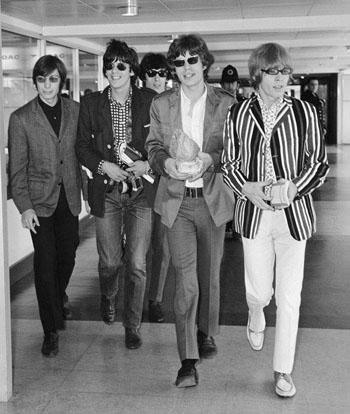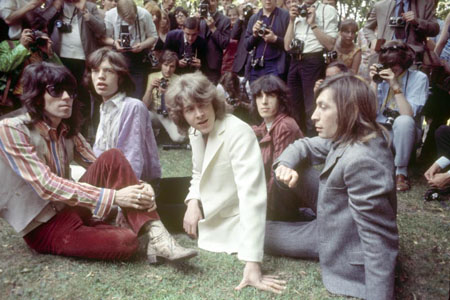First up, Melissa Anderson in the Voice: “‘There’s a sexual thing onstage between performer and audience,’ Mick Jagger, then 22, dryly observes in Charlie Is My Darling, Peter Whitehead’s 1965 chronicle of the Rolling Stones’ Irish tour. Watching the band stir lust and other primal instincts in MOMA’s invaluable survey of the Stones on celluloid, commencing 10 days before the group plays a handful of arena gigs to mark its golden anniversary, ranks as one of this year’s most voluptuous filmgoing experiences.” The Rolling Stones: 50 Years on Film, just a phenomenally packed series, opens tonight and runs through December 2. I rounded up a few reviews of Charlie when it screened at the New York Film Festival last month (scroll down).
Also tonight, HBO will broadcast Brett Morgen’s documentary Crossfire Hurricane, which premiered in London (click for reviews and the trailer). “There was a satisfyingly ear-splitting preview screening on Monday night at the Ziegfield, the last of Manhattan’s big one-room movie palaces,” reports the New Yorker‘s Hendrik Hertzberg. “The surviving Stones—Jagger, Richards, Watts, Wood—lent their physical presence to the event. They lined up in a clump below the screen, a piratical Mount Rushmore.”
“As a summary of the group’s history focusing on the first decade and a half of its existence,” writes the AV Club‘s Keith Phipps, Crossfire Hurricane “offers a brisk, compellingly made overview that hits all the major, expected landmarks of the band’s history to the accompaniment of new insights from the band’s members, both past and present. Of the many sources from which someone might learn about the Rolling Stones it’s better than most. But anyone looking for new details, or a new take on that story, should look elsewhere.”
What strikes Zach Wigon, writing for Indiewire, “is how apparent it is that the Stones understood the direction the music industry was pointed toward better than any other band at the time…. The Stones, unlike any other group from their era (including even The Beatles), crafted distinct larger-than-life personalities that they then put to work selling their group. Today, this method of salesmanship is the status quo in the music industry, but at the time it was innovative and, naturally, formative. What was it that led the Stones to this place? Clearly, they above all other groups understood that the 20th century was the century of cinema.”
Time‘s James Poniewozik notes that, “as the Stones began to break out after The Beatles’ success, the press framed their narrative as the villains to the Beatles’ nice guys, the satisfaction-getters vs. the hand-holders. It may have been a story, but it was one that the Stones readily enough embodied. They got big fast, they provoked and aroused millions, they were touched by drugs and eventually death. Like The Beatles, though, they also demonstrated an artistry, depth and ability to grow beyond the one-note media story of their early success. Just as The Beatles went from moptops writing simple pop songs to global experimentalists, the Stones went from straightforward blues rebellion to creating a kind of poetry of self-destruction, peaking with work like Exile on Main Street.”
As it happens, Movieline‘s Brian Brooks reports today that a new project, The Beatles Live! “is in the early stages, which will unearth rare treasures from the days of the fab four.” In this clip from Charlie Is My Darling that’s been making the rounds, the Stones loosely “cover” the Beatles:
And finally for now, tonight’s the last night of the BAMcinématek series A Quick One, While The Who’s in Town. In the L, Michael Atkinson writes of The Kids Are Alright that “if there were ever one film that captured, as if in amber, the winged, defiant exuberance of the mid-century bopping, headbanging, guitar-wrecking lifeforce that is rock and roll, it’s this six-pack of canned champagne, Jeff Stein’s historic archival record of The Who, released in 1979.” Unfortunately, its last screening was last night, but there’s still time to run out and catch Ken Russell’s Tommy (1975).
For news and tips throughout the day every day, follow @KeyframeDaily on Twitter and/or the RSS feed. Get Keyframe Daily in your inbox by signing in at fandor.com/daily.





